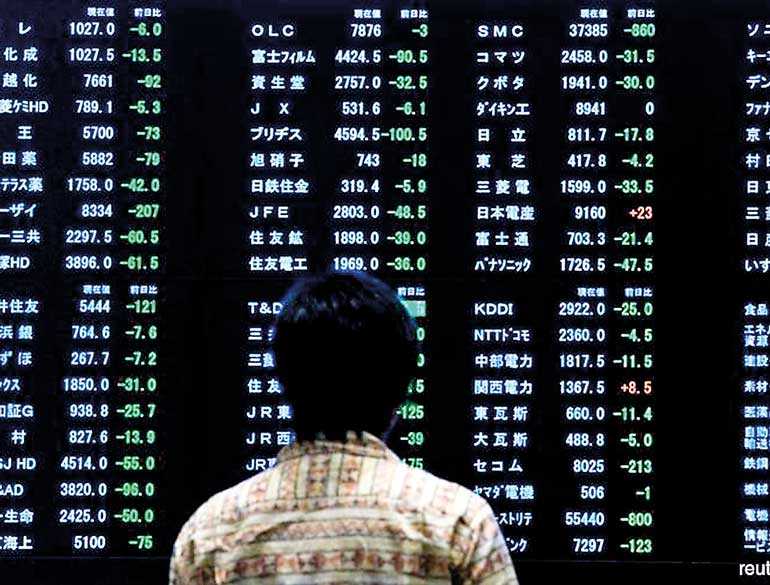Tuesday Feb 17, 2026
Tuesday Feb 17, 2026
Thursday, 24 October 2019 00:43 - - {{hitsCtrl.values.hits}}

TOKYO (Reuters): US stock futures and Asian shares slipped on Wednesday as revenue warnings from Texas Instruments raised worries about the global tech sector and after British lawmakers forced the government to hit the pause button on the latest Brexit deal.
S&P500 mini futures ESc1 dropped 0.3% while Japan’s Nikkei last stood almost flat after having fallen as much as 0.4%. MSCI’s broadest index of Asia-Pacific shares outside Japan fell 0.5%.
On Tuesday on Wall Street, the S&P 500 lost 0.36%.
After the bell, Texas Instruments, whose broad lineup of products makes it a proxy for the global chip industry, forecast current-quarter revenue to fall 10 to 17% from a year earlier, well below estimates.
Texas Instruments shares tumbled 9.8% in after-hour trade, driving down other chipmaker shares including Intel and Nvidia.
Worries that the global microchip industry is being squeezed by a downturn in demand and a prolonged US-China trade dispute sent some Asian chip-related shares lower.
Taiwan’s TSMC fell 0.2% while South Korea’s SK Hynix shed 0.7% and Japan’s Tokyo Electron slumped 3.7%.
“Given recent rally in semi-conductor shares, some adjustments will be inevitable,” said Nobuhiko Kuramochi, chief strategist at Mizuho Securities.
“But our investor survey has shown that many investors are still cautious on the sector so a bit of weakness in the industry would surprise few of them,” he added.
In the currency market, sterling dipped 0.15% to $ 1.2851 GBP=D4, falling further from five-month highs of $ 1.3012 set on Monday
But the currency still kept hefty gains made over the past fortnight on growing expectations that a no-deal Brexit will be avoided even though it is still not clear how the process will unravel.
On Tuesday, the British parliament voted in favour of Prime Minister Boris Johnson’s Brexit plan, but then rejected his timetable to fast-track legislation to take Britain out of the European Union. That effectively meant Britain would not be able to finalise its exit by Johnson’s Oct. 31 deadline.
The next step, Johnson said, would be waiting for the EU to respond to a request to delay the Oct. 31 Brexit date, which the prime minister reluctantly sent to Brussels on Saturday after being forced to do so by lawmakers.
A source in Johnson’s office said on Tuesday that a new election is the only way to move on from Britain’s Brexit crisis if the European Union agrees to a delay until January.
“Broadly speaking, there are two scenarios. There will be a short extension before the parliament will agree on Johnson’s plan. Or there could be a general election, which would need a longer extension,” said Kyosuke Suzuki, director of forex at Societe Generale. “But it now seems unlikely that Britain will crash out of the EU on Oct. 31,” he said.
Receding worries about a no-deal Brexit also underpinned the euro, which stood at $ 1.1122 EUR=, flat on the day and a tad below Monday’s two-month high of $ 1.1180.
The yen ticked up 0.15% to 108.31 yen per dollar JPY=, in a slow recovery since hitting a 2-1/2-month low of 108.94 on Thursday.
The dollar was broadly weak, ahead of a Federal Reserve policy meeting next week, where policy makers are expected to cut interest rates by 0.25 percentage point.
Oil prices fell after industry group data showed US crude stocks rose more than expected last week.
Still, on the whole the market held firm after China signalled progress in trade talks with the United States and OPEC and its allies pondered deeper production cuts.
Brent crude LCOc1 futures fell 0.52% to $ 59.39 a barrel while US West Texas Intermediate (WTI) crude CLc1 lost 0.81% to $ 54.04 per barrel.